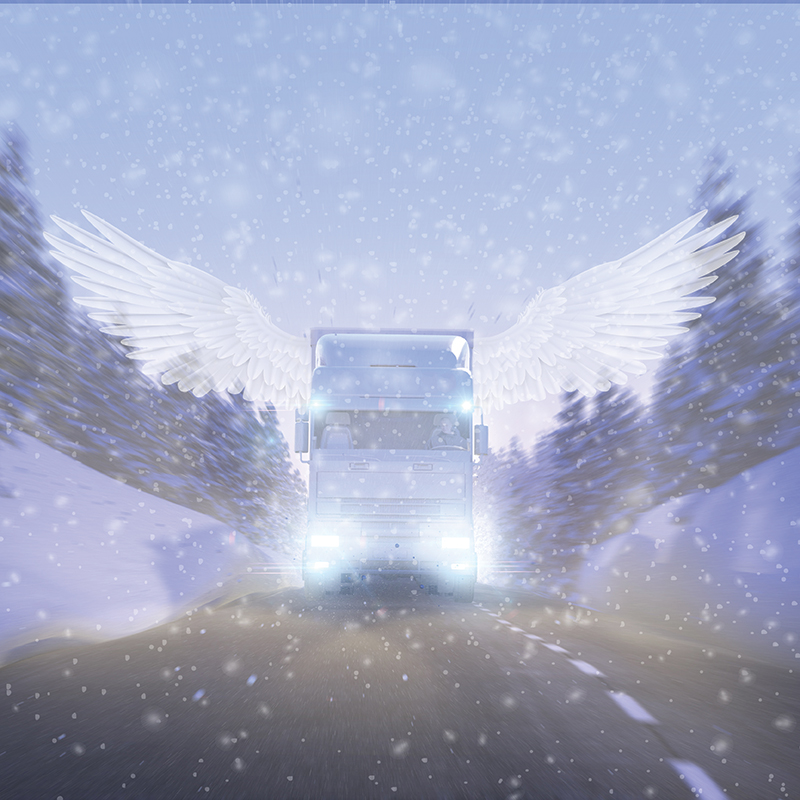A Mountain Rescue
A Mountain Rescue: In a blazing snowstorm, a Marion resident recounts a stranger’s act of kindness

It was the Saturday before Christmas in 1981. My mother and I had shopped at the Asheville Mall, and before we left Buncombe County, we dropped by the campus of Warren Wilson College for dessert with my English professor and his wife. After homemade baklava and a cup of tea, my mother and I started home to Marion. Snow had begun to fall.
We headed to Old Fort Mountain, a section of I-40 where Buncombe County merges into McDowell County. Though scenic, this five-mile stretch of highway is dangerously steep and curvy. During my commutes to Warren Wilson, I had witnessed runaway tractor-trailers with overheated brakes veering into emergency sand piles.
As we approached the top of Old Fort Mountain, snow drifted across the highway in swirls. Soon, the road would be white.
“We should’ve left earlier,” I told my mother. I pressed my Gremlin’s brake pedal to slow down before our descent, and the pedal sunk farther than normal. I had experienced brake problems before and knew I was in trouble. I didn’t want to scare my mother, so I kept quiet. I eased the car onto the truck pull-off, sliding as we stopped.
“Ooh, the road’s slick,” my mother said, thinking I’d pulled off because I was afraid to drive in the snow. While we sat there with the car running, I looked over at my mother, whose life was in my hands. I didn’t know what to do.
Just then, I noticed in my rearview mirror that a tractor-trailer had pulled in behind me. I saw the driver get out of his rig and head my way.
I knew this pull-off was not for cars. Truck drivers were required to stop here and check their loads and equipment before starting down the mountain. I hoped this truck driver wasn’t irritated with me for parking here. He stepped up to my window, and I cranked it down.
“Is something wrong?” he asked, glancing over at my mother.
He was a young driver, maybe 30. He was lean and pale, with short, dark hair and bangs cut high on his forehead. He wore jeans and a white T-shirt.
So my mother wouldn’t hear, I almost whispered, “I don’t think my brakes are working right. I’m afraid to drive down the mountain.”
He crossed his arms to stay warm.
“Are your brakes working at all?”
“Some,” I said. “I managed to stop here.”
“Well, I’ll see if I can slow down the idling. That might help.”
He went to his truck and brought back a screwdriver. He raised my car hood and worked for a few minutes. He slammed the hood shut and came back to my window.
“That should help,” he said, his teeth chattering in the cold and snow sticking to his hair. “When you start down, I’ll stay behind you. Put your car in low gear. If you think you can’t slow down enough, put your emergency brake on and pull off the road. I’ll pull off behind you. Just go as slow as you can, and I’ll follow you down the mountain. I think you’ll be okay.”
“Thank you,” I said.
I pulled out into the slow lane, and he pulled out behind me. My heart pounded, and my hands shook on the steering wheel as I crept along. I kept my foot on the brake pedal, praying that I could make it to the bottom of the mountain. Occasionally I glanced in my rearview mirror to make sure he was there, and he was. Finally, I came to the Old Fort exit, which would take us to Highway 70 and to Marion. As the truck driver and I parted ways, he blew his horn goodbye to my mother and me. I waved, but I doubt he saw me. He continued on the interstate, and was gone in a flash.
Later, I admitted to my mother why we had pulled off at the top of the mountain and explained how the truck driver had helped us. She said, “He was a nice man.”
“Yes, he was,” I agreed. He was a guardian angel, I thought then—and I still do.